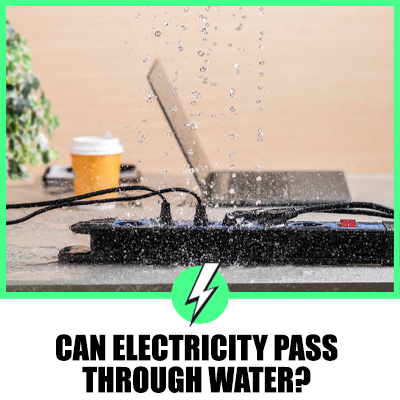Can Electricity Pass Through Water? A Comprehensive Analysis
Electricity and water: a combination that sparks curiosity and caution in equal measure. This article aims to demystify the relationship between these two elements.
We’ll explore what happens when electricity passes through water, how far it can travel, and whether it can traverse wet ground.

Contents
What Happens When Electricity Passes Through Water?
When electricity comes into contact with water, it seeks the path of least resistance.
Water, in its pure form, is not a good conductor of electricity.
However, the water we encounter daily is rarely pure. It often contains impurities like salts and minerals, which are excellent conductors of electricity.
When an electric current is introduced to such water, it moves through these impurities. This creates a potentially dangerous situation.
The electricity can cause the water to become charged. This can lead to harmful or even fatal consequences for any living organisms in contact with the water at that time.
This is a crucial point to understand, especially for those living in regions with frequent rainfall or near bodies of water.
In the UK, for instance, the weather can be quite unpredictable, with sudden rain showers being a common occurrence.
Similarly, in the US, states like Florida and Louisiana experience heavy rainfall. This increases the risk of electrical accidents if safety precautions are not taken.
How Far Can Electricity Travel Through Water?
The distance electricity can travel in water depends on several factors. These include the strength of the electric current, the concentration of impurities in the water, and the water’s temperature.
In a vast body of water like the ocean, the electrical current from a single source would quickly disperse due to the immense volume of water.
However, in a confined space like a bathtub, the current can be lethal.
One user on a discussion forum estimated that under certain conditions, a dangerous electrical current could potentially travel approximately 110 meters in seawater.
However, this is a rough estimate. The actual distance can vary significantly based on the factors mentioned earlier.
This information is particularly relevant for those who enjoy water-related activities.
In the UK, activities such as swimming in the sea, lakes, or rivers are popular pastimes, especially during the summer.
In the US, people often enjoy boating or fishing in the Great Lakes or the Gulf of Mexico.
Understanding the behavior of electricity in water can help ensure safety during these activities.
Can Electricity Travel Through Wet Ground?
Yes, electricity can indeed travel through wet ground.
The moisture in the ground acts as a conductor, allowing electricity to move through it.
This is why it’s dangerous to be in contact with the ground during a lightning storm.
If lightning strikes the ground nearby, the electric current can travel through the wet ground and potentially cause harm.
This is a critical safety consideration for both UK and US residents.
In the UK, where the ground is often wet due to frequent rain, the risk of electrical current traveling through the ground is higher.
Similarly, in the US, states with high rainfall, such as Washington and Oregon, should be particularly aware of this risk.
Insights from Online Discussions
Online discussions on this topic reveal a range of perspectives and experiences.
Some users highlight the dangers of mixing electricity and water, emphasizing the risk of electrocution.
Others delve into the science behind how electricity travels through water. They discuss factors like the presence of impurities and the speed of the electric current.
One user on a physics forum even discussed the possibility of electricity traveling up a stream of water. They concluded that it is indeed possible.
Meanwhile, a discussion on Reddit explored the distance electricity can travel in water. One user provided a detailed explanation and rough estimate.
Conclusion
While the interaction between electricity and water is a fascinating scientific phenomenon, it’s crucial to remember the potential dangers involved.
Always exercise caution when dealing with electricity, especially around water, to ensure your safety and the safety of those around you.
Whether you’re in the UK, with its unpredictable weather and love for outdoor water activities, or in the US, with its diverse climate and vast bodies of water, understanding the relationship between electricity and water is essential.
Stay informed, stay safe, and remember: when it comes to electricity and water, caution is key.





